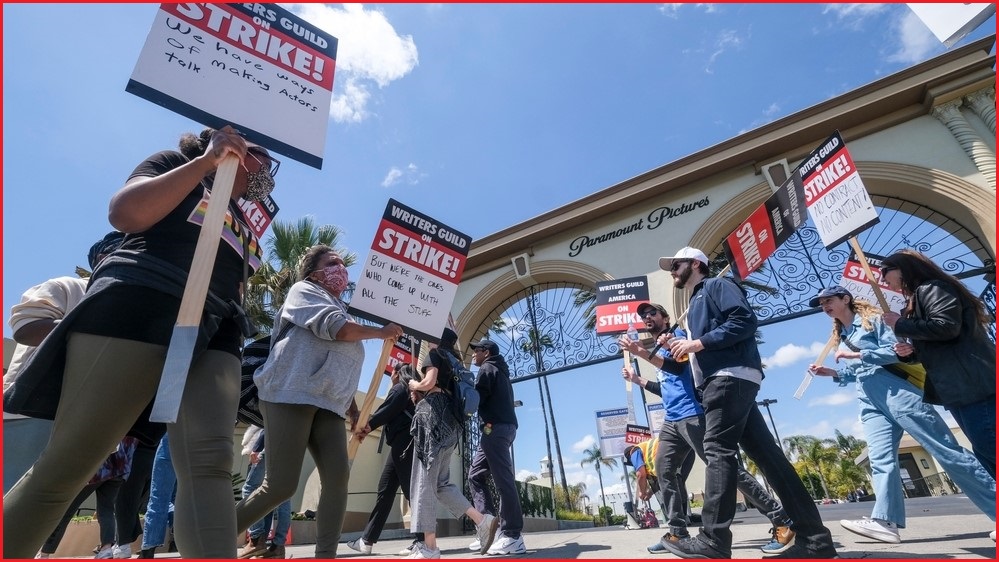Droves of Hollywood writers have taken their fingers off keyboards in a major union strike against underpayment and unethical AI adoption in the writer's room.
In what could pass for an episode of Black Mirror, writers and Hollywood stars have taken to the streets with picket signs in hand to protest a perceived 'gig' economy and the all-too-real prospect of writers being replaced by AI.
The Writers Guild of America (WGA), a labour union representing writers for film and television, called the strike effective 2 May – banding together thousands of Hollywood's top creatives in a joint work-hiatus effort.
The strike comes after six weeks of tumultuous negotiations between WGA and studios and streaming platforms such as Netflix, Amazon, Apple, Disney, Discovery-Warner, NBC Universal, Paramount and Sony, negotiating under the umbrella of the Alliance of Motion Picture and Television Producers (AMPTP).
During negotiations, the union raised proposals around industry employment practises, viewership-based streaming residuals for well-performing shows, and notably, the use of AI in the writer's room.
"The companies' behaviour has created a gig economy inside a union workforce, and their immovable stance in this negotiation has betrayed a commitment to further devaluing the profession of writing," said WGA.
"From their refusal to guarantee any level of weekly employment in episodic television, to the creation of a ‘day rate’ in comedy variety, to their stonewalling on free work for screenwriters and on AI for all writers, they have closed the door on their labour force and opened the door to writing as an entirely freelance profession."
As the unrest between WGA and AMPTP continues, production on the highly anticipated final season of Netflix's Stranger Things has been delayed, and popular shows such as Saturday Night Live and Late Night with Jimmy Fallon have been taken off the air in favour of reruns for the foreseeable future.
Does AI belong in the writer's room?
While the focus of the union effort is fair wages, strikers were quick to draw a line between equitable hiring practices and the looming threat of artificial intelligence being used in lieu of human writers.
Central to the discourse is popular AI conversational tool, ChatGPT, which has attracted anxiety for its ability to generate narrative content in response to simple prompts.
Greg Brockman, the president and co-founder of ChatGPT creator OpenAI, recently hyped up the notion of AI-written entertainment when he mused over the possibility of using AI to rewrite Game of Thrones.
"Maybe people are still upset about the last season of Game of Thrones. Imagine if you could ask your AI to make a new ending that goes a different way and maybe even put yourself in there as a main character or something," said Brockman.
During a panel at SXSW, Brockman said ChatGPT could help do the "drudge work" for writing and help foster a more "interactive" entertainment experience.
"That is what entertainment will look like," he said.
In negotiations, WGA proposed regulating the use of AI in the writer's room, and suggested AI should be prevented from writing or altering literary material covered by the union's Minimum Basic Agreement (MBA).
It also suggested MBA-covered material should be prevented from being used to train AI – AMPTP rejected the union's proposals and countered by offering "annual meetings to discuss advancements in technology."
Writers raise picket signs
One of the common gripes with artificial intelligence is how it can muddy the waters between original and "stolen" content – even when AI can produce a script or outline an idea for a new series, it utilises a dataset typically trained by the work of hundreds of often uncompensated writers.
Amid vocal protests against AI and low-wages, writer and actress Quinta Brunson held a flavourful WGA-branded sign reading "AI can't write Tariq's raps" – referencing a character from fan-favourite Hulu series Abbot Elementary.
Another picketer lambasted executives with a sign reading "Replace executives with AI!"
While generative-AI technology is a way off from producing high-quality scripts, it has already proven disruptive in other creative fields.
Recently, a song featuring AI-generated mock vocals of popular musician Drake went viral on music streaming platforms – totalling 600,000 plays on Spotify and millions on Tiktok before being pulled down.
"AI is terrifying," said Danny Strong, the creator of TV series Dopesick and Empire.
“Now, I’ve seen some of ChatGPT’s writing and as of now I’m not terrified because Chat is a terrible writer. But who knows? That could change.”
AMPTP shows no signs of yielding to WGA's labour and anti-AI demands as the strike approaches its seventh day.










